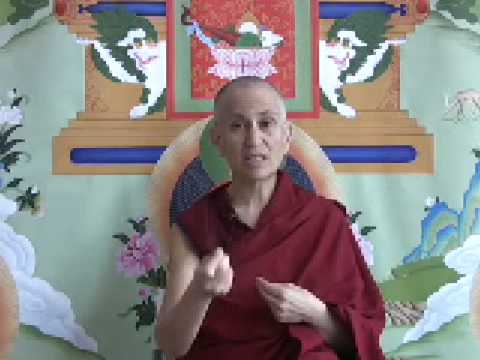Verse 34-6: Three Jewels, rebirth, and karma
Part of a series of talks on the 41 Prayers to Cultivate Bodhicitta from the Avatamsaka Sutra (the Flower Ornament Sutra).
- Wrong views in the context of the ten nonvirtues
- Wrong views in the context of the afflictions
- Examining if we really believe in the existence of the Three Jewels, karma, and rebirth
41 Prayers to cultivate bodhicitta: Verse 34-6 (download)
We were talking about wrong views yesterday, and about,
“May all beings be unkind to wrong views.”
This is the prayer of the bodhisattva when seeing someone not repaying kindness.
We had talked about the first three of the afflicted views. The view of the transitory aggregates and then the view of eternalism and nihilism or absolutism and nihilism. Then the wrong view of the bad modes of conduct of the path and then wrong view. Let’s spend some time on wrong view.
Actually before I spend the time on wrong view let me just to go on to the fifth one which is the view that thinks that the previous four afflicted views are the best views in the world to hold. I don’t want to forget that one, but to let you know, “Yes, it is the right view, best one to hold.” and so we just kind of compound the wrong views.
Let’s go back to wrong views in particular. The category of wrong views includes all the wrong views but it particularly emphasizes three of them, which are: not believing in the existence of Buddha, Dharma, Sangha; not believing in rebirth; and not believing in the existence of karma and its effects.
Regarding these three, not all of us can say with absolute certainty, “Yes, I am totally convinced that these exist.” But when we are talking about wrong views—at least in the context of the ten nonvirtues—then we are talking about a view where we have come to a stubborn conclusion that we are clinging to very hard. That’s the wrong views in the context of the ten nonvirtues.
Here we are talking about wrong views in the context of the afflictions. We may have certain times in our lives where we just have … not doubt (because doubt is bad enough), but where we go, “I don’t think these really exist.” It’s something to really look out for. When we talk about the right views, we all talk about, “Yes I believe in karma, I believe in the Three Jewels, I believe in rebirth.” But do we live our lives as if we believe in them? We believe in them in one way on an intellectual level, when we discuss and debate, “Yes, that makes sense and I believe in these things.” But do we live our lives as if we believe them? That one’s harder, isn’t it? I mean if we really, really, really believed in karma and the effects of our actions there are a lot of things that we wouldn’t justify doing. If we really believed in rebirth, there are a lot of things that we would be doing. Or would not be doing. If we really, really believed in the Three Jewels and in our potential to become them, then it would very much change how we live.
These three things are pointed out, but actually there are a lot of other things that are mixed in with that. In order to understand rebirth and accept rebirth we have to understand the nature of the mind. We have to understand that the nature of the mind is clear and knowing. We have to understand that defilements are adventitious and that antidotes to them exist. If we don’t understand that, and understand that one moment of mind causes the next moment of mind, then we’re not going to believe in rebirth, and we’re not going to believe in the possibility of enlightenment. And then we’re not going to believe in the existence of the Three Jewels. All of these things are tied together.
Also if we don’t really believe in the existence of mind, if we think that mind is just an offshoot of the brain, then there’s no sense believing in karma. It’s just chemical and electrical procedures in the brain and there’s no action that can have a moral consequence because how can chemicals and electrons and things like that have moral influence? Sometimes all these things can come together.
Sometimes you hear people speak about their views and they’ll have one wrong view but they won’t have another. They’ll accept one thing—for example, that there’s rebirth—but they won’t accept that actions have moral consequences. Or they might accept that actions have ethical consequences but they won’t accept that those consequences happen in a future life. Or they might except that things have ethical consequences but they think killing and stealing and these things are good as long as you have a good motivation, which we always have anyway because it’s our motivation.
It’s very interesting when we really start looking very deeply at the kinds of views we have, and the kinds of views other people have, and the kinds of views that whole philosophies of people have. Which things people accept, what they reject, and do all of those things hang together? In other words, if you start scratching and say “You believe in this, then how does that fit with this? Do those things actually hang together?” Then you come upon inconsistencies.
As much as I belong to a tradition that believes in the value of reasoning and logic, I still have the sneaking suspicion that very often we decide first what we believe and then we pick out the scripture and quotations and the reasoning that validate it. You see in the Christian seminars there are whole theologies about the existence of God using reasoning to prove the existence of God. Now, from our view those reasoning’s aren’t real reasonings. Then sometimes you see things asserted in Buddhist scripture (such as a lot of the social commentary that are accepted in Buddhists scripture because of the society at the time of the Buddha). People have never applied reasoning and logic to those. Not “never,” but often in the cultures that hold so strongly to Buddhism, some of what I consider horrific social values and prejudices continue to exist because somehow reasoning has never been applied to them. Or if it’s applied, it’s applied in a way that doesn’t make any sense to me.
Anyway that’s enough today about wrong views. We can talk more about them in the upcoming days.
Venerable Thubten Chodron
Venerable Chodron emphasizes the practical application of Buddha’s teachings in our daily lives and is especially skilled at explaining them in ways easily understood and practiced by Westerners. She is well known for her warm, humorous, and lucid teachings. She was ordained as a Buddhist nun in 1977 by Kyabje Ling Rinpoche in Dharamsala, India, and in 1986 she received bhikshuni (full) ordination in Taiwan. Read her full bio.


